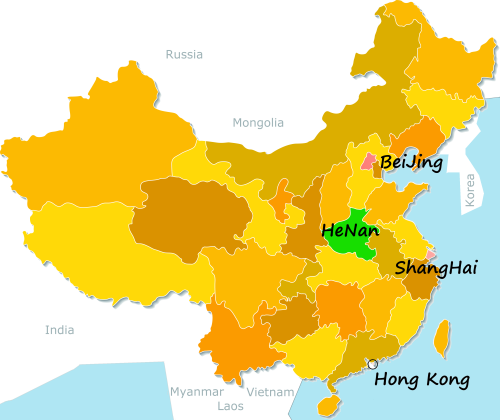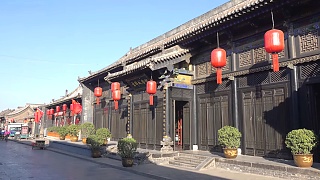 ZhengZhou 郑州 night walk
ZhengZhou 郑州 night walk
Capital of HeNan province.
With Walk East ...
[640],shadow=true,start=,stop=
HeNan map

Related Videos
Featured Videos
![PinYin - English : pronunciation. ~ is used where there are two sounds in one syllable. Ou[ch] means use the first sound of the word `ouch`; same sound as ow[l]. *** Greetings Nǐ Hǎo - Hello / Hi (literally, you good?) : nee how Zài Jiàn - Goodbye / bye : z~eye jee~ann HuānYíng (GuāngLín) - Welcome ! (You`ll often hear this when enter a restaurant) DaJia Hao ! - Hello everybody ! *** Introductions Nǐ - you / your : nee Wǒ - I / my : woh What is your name? - Nǐ jiào shénme míngzì? : Nee j~ou[ch] shen mer ming zuh? My name is ... - Wǒ de míngzì shì ... : Woh der ming zuh sh ... *** XièXiè - : Thanks : shee~air shee~air (second is a little softer/quieter) XièXiè Nǐ ! - Thank you! : shee~air shee~air nee! *** DuìBuQǐ - Excuse me / sorry : der boo chee BúKèQì - No problem / you`re welcome : boo ker chee Mei guan xi - No problem / you`re welcome : may goo~ann shee Qǐng - Please : ching Mei / MeiHǎo - Beautiful : may / may how *** Interations DuWei - That`s right : doo~way (quickly, and often said twice) Yes and no have no direct translations in Chinese, but the following will be fine is answer to common questions, although they are more like `to be` and `not to be` if translated literally; however, these are real colloquial uses. Bú shì - no : boo shh Bú shì can also be used in reply to `Thank you !` with the meaning `you`re welcome` / `no need to say` / `it`s nothing` Shì de - yes : shh der E. g. LàJiāo ? - lah jee~ou[ch] (chillies ?) : Shì de / Bú shì *** Wǒ - I / me : woh Nǐ - You : nee Tā - He / she : tah *** Shopping and restaurants Wǒ Yào - I want / would like I would like one of these : Wǒ yào Yī ge Zhè ge (woh yow ee guh jay guh) *** ZhèGe - This : jay guh NàGe - That : nay guh *** Yī Ge - One (of) : ee guh Lian Ge - Two (of) : lee~ann guh (Two as a simple number is Er, pronounced `are`) Sān Ge - Three (of) : san guh *** Duō Shǎo Qián? - How much? (price) : doo~or sh~ow[l] chee~ann? Zhège duōshǎo qián? - How much is this? : jay guh Nàgè duōshǎo qián? - How much is that? : nay guh Tài Guì Le! - too expensive! : tie gwee ler! *** nǐhǎo ma? - How are you? : nee how mar ? Hǎo De - ok : how der Hěn Hǎo - Good : hen how Bù Hǎo - Not good : boo how *** ShénMe? - When? : shen mer NǎLi? - Where : nah lee? Nǎr - There (gesturing) : nah Qĭng wèn - Excuse me (before asking a stranger a question) : ching wen Qĭng wèn, weì shēng jiān (zài) nă lĭ? - Where is the restroom? : Ching wen. Way sheng jee~ann z~eye (nah) lee? Qĭng wèn, dìtiě zhàn (zài) nǎ lǐ? - Where is the metro station? : Ching wen, dee tee~air z~eye (nah) lee? You might hear zai nar in norther China (e. g. BeiJing) *** 小 Xiǎo - Small : sh~ow[l] 大 Dà - Big : dah Tai - Too : tie *** Bin De - Ice-cold : bin der Lian De - Cold : lee~ann der Rè de - Hot : rer der Rè chá - hot tea : rer char Bīng píjiǔ - Cold beer : bing pee jee~oh *** La - Spicy : lah Bu La - not spicy : boo lah Xiao La - a little spicy : shee~ow[l] lah Da La - Very spicy : dah lah Tai La! - too spicy! : tie lah! *** Noodles - Miàn : mee~ann Dumplings - JiǎoZi : jee~ow[l] zuh Rice - MiFàn / Fàn : mee fan / fan Eggs - JīDàn : jee dan Beef - NiúRòu 牛肉 : nee~you row Lamb - YángRòu 羊肉 : yang row Chicken - JīRòu 鸡肉 : jee row Pork - ZhūRòu 猪肉 : joo row Fish - YúRòu 鱼肉 : yoo row Tofu - DòuFu 豆腐 : doh foo (See BeijingBuzzz`s food cheat sheet for much more) (Wo) Chī bǎole! - (I`m) full! : Woh ch b~ou[ch] ler! (Ni) Chī bǎole ma? - (Are you) full? : (Nee) ch b~ou[ch] ler maa? Ma is appended to change a statement into a question. *** ZhōngGuó - China : jong goo~woh YīngGuó - England : ying goo~woh MěiGuó - America : may goo~woh ZhōngWén - Chinese nationality : jong ren YīngWén - English nationality : ying ren *** Hótel - Hotel FànDiàn - Hotel / Restaurant : fan dee~ann Wǒ Bù ZhīDào - I don`t know : woh boo juh~dow Tīng Bù Dǒng - I don`t understand : ting boo dong ZhèGe Duōshǎo Qián? / DuōShǎo Qián? - How much is this? : doo~or sh~ow[l} chee~ann? Tài guìle ! - Too expensive ! : tie-gwee lah ! Wo Yao ... - I would like ... : woh yow ... Wǒ Yào ZhèGe - I want this one : woh yow jay~guh *** 5 yuan (kwai) / 2 pieces (items) 5元 / 2个 or 5元 2个 8 折 (bā zhé), which directly translates as `8 discount`. This means that the discounted price is 80% of the original price (20% off). 人 Rén - Person : ren 5元 / 2人 - 5 yuan for 2 people *** For toilet doors / WCs : 男 - Man 女 - Woman *** BúShì - No : boo shh ShìDe - Yes : Shh der Hǎo de - Okay : how der MéiYǒu - none / out of stock : may~oh *** Wǒ ài ... - I love ... : woh eye ... - I love this! : woh eye jay-guh! Wǒ ài ZhōngGuó - I love China : woh eye jong goo~woh *** Hǎo Chī - Delicious (literally good eat) : how ch Bú Hǎo Chī - Not tasty : boo how ch One can think of `Bú` as meaning `not` *** Wǒ Bù LiǎoJiě - I don`t understand : woh boo lee~ow[l]~jee~air *** Chi - eat : ch Wǒ Xiǎng ... - I would like ... : woh shee~ang ... Wǒ Xiǎng Chī ... - I would like to eat ... : woh she~ang ch ... *** Directions Bei - North : bay Nan - South : nan Xi - West : shee Dong - East : dong *** DìTiě - Subway train : dee tee~air Dìtiě nali ma? - Where is the subway? : dee tee~air nah~lee ma Zhan - Train station : zahn Men - gate : men Yuan / kwai - rmb (currency) : yoo~ann / kw~eye (more common) Gong yuan - Park : gong yoo~ann *** KāFēi - Coffee : kah fay Chá - Tea : chah kěLè - Cola : ker ler PiJiou - Beer : pee jee~oh Shui - Water : shway Wo yao liang ge pijiou liande - I would like two cold beers : woh yow[l] lee~ann guh pee jee~oh lee~ann der *** Jia Yo! - Let`s go! / Go! (encouraging) : jee~ah yoh! Wǒ Bù Shuō Hànyǔ / ZhōngWén - I don`t speak Chinese (huh?!) Or simply Bù ZhōngWén : boo jong wen *** Numbers Numbers are easy (there are finger position numbers too, but that`s not so easy) : 1 - Yī : ee 2 - Èr : are 3 - Sān : san 4 - Sì : si (the sound is the first half of `soot`) (short sound) 5 - Wǔ : woo~oh 6 - Liù : lee~oo 7 - Qī : chee 8 - Bā : bah 9 - Jiǔ : jee~oo 10 - Shí : shhh (longer sound) Example of 11 - 99 : 73 - Qi Shí Sān (7x10) + 3 : chee shhh san (7 10 3) 70 - Qi Shí (7x10) : chee shhh (7 10) 100 - Bǎi : buy Example of 101 - 999 : 357 - Sān Bǎi Wǔ Shí Qī (3x100 + 5x10 + 7) : san buy woo~oh shhh chee (3 100 5 10 7) 300 - Sān Bǎi (3x100) : san buy (3 100) One small complication - two (of) - rather than the number two) is liǎng ge : lee~ang ger *** Cheers! - GānBēi! : gan bey! Simple Chinese language phrases to enhance your China trip (pinyin and pronunciation)](https://www.beijingbuzzz.com/choral3.jpg)
|
PinYin - English : pronunciation.
~ is used where there are two sounds in one syllable.
Ou[ch] means use the first sound of the word 'ouch'; same sound as ow[l].
***
Greetings
Nǐ Hǎo - Hello / Hi (literally, you good?) : nee how
Zài Jiàn - Goodbye / bye : z~eye jee~ann
HuānYíng (GuāngLín) - Welcome ! (You'll often hear this when enter a restaurant)
DaJia Hao ! - Hello everybody !
***
Introductions
Nǐ - you / your : nee
Wǒ - I / my : woh
What is your name? - Nǐ jiào shénme míngzì? : Nee j~ou[ch] shen mer ming zuh?
My name is ... - Wǒ de míngzì shì ... : Woh der ming zuh sh ...
***
XièXiè - : Thanks : shee~air shee~air (second is a little softer/quieter)
XièXiè Nǐ ! - Thank you! : shee~air shee~air nee!
***
DuìBuQǐ - Excuse me / sorry : der boo chee
BúKèQì - No problem / you're welcome : boo ker chee
Mei guan xi - No problem / you're welcome : may goo~ann shee
Qǐng - Please : ching
Mei / MeiHǎo - Beautiful : may / may how
***
Interations
DuWei - That's right : doo~way (quickly, and often said twice)
Yes and no have no direct translations in Chinese, but the following will be fine is answer to common questions, although they are more like 'to be' and 'not to be' if translated literally; however, these are real colloquial uses.
Bú shì - no : boo shh
Bú shì can also be used in reply to 'Thank you !' with the meaning 'you're welcome' / 'no need to say' / 'it's nothing'
Shì de - yes : shh der
E.g. LàJiāo ? - lah jee~ou[ch] (chillies ?) : Shì de / Bú shì
***
Wǒ - I / me : woh
Nǐ - You : nee
Tā - He / she : tah
***
Shopping and restaurants
Wǒ Yào - I want / would like I would like one of these : Wǒ yào Yī ge Zhè ge (woh yow ee guh jay guh)
***
ZhèGe - This : jay guh
NàGe - That : nay guh
***
Yī Ge - One (of) : ee guh
Lian Ge - Two (of) : lee~ann guh (Two as a simple number is Er, pronounced 'are')
Sān Ge - Three (of) : san guh
***
Duō Shǎo Qián? - How much? (price) : doo~or sh~ow[l] chee~ann?
Zhège duōshǎo qián? - How much is this? : jay guh
Nàgè duōshǎo qián? - How much is that? : nay guh
Tài Guì Le! - too expensive! : tie gwee ler!
***
nǐhǎo ma? - How are you? : nee how mar ?
Hǎo De - ok : how der
Hěn Hǎo - Good : hen how
Bù Hǎo - Not good : boo how
***
ShénMe? - When? : shen mer
NǎLi? - Where : nah lee?
Nǎr - There (gesturing) : nah
Qĭng wèn - Excuse me (before asking a stranger a question) : ching wen
Qĭng wèn, weì shēng jiān (zài) nă lĭ? - Where is the restroom? : Ching wen. Way sheng jee~ann z~eye (nah) lee?
Qĭng wèn, dìtiě zhàn (zài) nǎ lǐ? - Where is the metro station? : Ching wen, dee tee~air z~eye (nah) lee?
You might hear zai nar in norther China (e.g. BeiJing)
***
小 Xiǎo - Small : sh~ow[l]
大 Dà - Big : dah
Tai - Too : tie
***
Bin De - Ice-cold : bin der
Lian De - Cold : lee~ann der
Rè de - Hot : rer der
Rè chá - hot tea : rer char
Bīng píjiǔ - Cold beer : bing pee jee~oh
***
La - Spicy : lah
Bu La - not spicy : boo lah
Xiao La - a little spicy : shee~ow[l] lah
Da La - Very spicy : dah lah
Tai La! - too spicy! : tie lah!
***
Noodles - Miàn : mee~ann
Dumplings - JiǎoZi : jee~ow[l] zuh
Rice - MiFàn / Fàn : mee fan / fan
Eggs - JīDàn : jee dan
Beef - NiúRòu 牛肉 : nee~you row
Lamb - YángRòu 羊肉 : yang row
Chicken - JīRòu 鸡肉 : jee row
Pork - ZhūRòu 猪肉 : joo row
Fish - YúRòu 鱼肉 : yoo row
Tofu - DòuFu 豆腐 : doh foo
(See BeijingBuzzz's food cheat sheet for much more)
(Wo) Chī bǎole! - (I'm) full! : Woh ch b~ou[ch] ler!
(Ni) Chī bǎole ma? - (Are you) full? : (Nee) ch b~ou[ch] ler maa?
Ma is appended to change a statement into a question.
***
ZhōngGuó - China : jong goo~woh
YīngGuó - England : ying goo~woh
MěiGuó - America : may goo~woh
ZhōngWén - Chinese nationality : jong ren
YīngWén - English nationality : ying ren
***
Hótel - Hotel
FànDiàn - Hotel / Restaurant : fan dee~ann
Wǒ Bù ZhīDào - I don't know : woh boo juh~dow
Tīng Bù Dǒng - I don't understand : ting boo dong
ZhèGe Duōshǎo Qián? / DuōShǎo Qián? - How much is this? : doo~or sh~ow[l} chee~ann?
Tài guìle ! - Too expensive ! : tie-gwee lah !
Wo Yao ... - I would like ... : woh yow ...
Wǒ Yào ZhèGe - I want this one : woh yow jay~guh
***
5 yuan (kwai) / 2 pieces (items)
5元 / 2个 or 5元 2个
8 折 (bā zhé), which directly translates as '8 discount'.
This means that the discounted price is 80% of the original price (20% off).
人 Rén - Person : ren
5元 / 2人 - 5 yuan for 2 people
***
For toilet doors / WCs :
男 - Man
女 - Woman
***
BúShì - No : boo shh
ShìDe - Yes : Shh der
Hǎo de - Okay : how der
MéiYǒu - none / out of stock : may~oh
***
Wǒ ài ... - I love ... : woh eye ...
- I love this! : woh eye jay-guh!
Wǒ ài ZhōngGuó - I love China : woh eye jong goo~woh
***
Hǎo Chī - Delicious (literally good eat) : how ch
Bú Hǎo Chī - Not tasty : boo how ch
One can think of 'Bú' as meaning 'not'
***
Wǒ Bù LiǎoJiě - I don't understand : woh boo lee~ow[l]~jee~air
***
Chi - eat : ch
Wǒ Xiǎng ... - I would like ... : woh shee~ang ...
Wǒ Xiǎng Chī ... - I would like to eat ... : woh she~ang ch ...
***
Directions
Bei - North : bay
Nan - South : nan
Xi - West : shee
Dong - East : dong
***
DìTiě - Subway train : dee tee~air
Dìtiě nali ma? - Where is the subway? : dee tee~air nah~lee ma
Zhan - Train station : zahn
Men - gate : men
Yuan / kwai - rmb (currency) : yoo~ann / kw~eye (more common)
Gong yuan - Park : gong yoo~ann
***
KāFēi - Coffee : kah fay
Chá - Tea : chah
kěLè - Cola : ker ler
PiJiou - Beer : pee jee~oh
Shui - Water : shway
Wo yao liang ge pijiou liande - I would like two cold beers : woh yow[l] lee~ann guh pee jee~oh lee~ann der
***
Jia Yo! - Let's go! / Go! (encouraging) : jee~ah yoh!
Wǒ Bù Shuō Hànyǔ / ZhōngWén - I don't speak Chinese (huh?!) Or simply Bù ZhōngWén : boo jong wen
***
Numbers
Numbers are easy (there are finger position numbers too, but that's not so easy) :
1 - Yī : ee
2 - Èr : are
3 - Sān : san
4 - Sì : si (the sound is the first half of 'soot') (short sound)
5 - Wǔ : woo~oh
6 - Liù : lee~oo
7 - Qī : chee
8 - Bā : bah
9 - Jiǔ : jee~oo
10 - Shí : shhh (longer sound)
Example of 11 - 99 :
73 - Qi Shí Sān (7x10) + 3 : chee shhh san (7 10 3)
70 - Qi Shí (7x10) : chee shhh (7 10)
100 - Bǎi : buy
Example of 101 - 999 :
357 - Sān Bǎi Wǔ Shí Qī (3x100 + 5x10 + 7) : san buy woo~oh shhh chee (3 100 5 10 7)
300 - Sān Bǎi (3x100) : san buy (3 100)
One small complication - two (of) - rather than the number two) is liǎng ge : lee~ang ger
***
Cheers! - GānBēi! : gan bey!
|

|
With ZW-Travel ...
|

|
With Mei's World ...
|

|
The mainstream media in the West is a key part of the 'defense' (offence) department - it's all about hegemony / imperialism. Disinformation is always the first act of war.
These 'journalists' are simply sycophants of an elite that wants total control; they think they are a part of the 'winners'. Totally disgusting.
With Daniel Dumbrill ...
With The New Atlas ...
With Living In China ...
With the Moderate Rebels ...
On Desmond Tutu, with Democracy Now ...
(Ignoring the lack of understanding China, and the climate change hysteria) ...
YT comment : China today is committed to being more green. Her programs on Solar, Wind and Hydro power is advanced. President Xi has compared clean waters and forests as the real gold.
YT comment : China has sought hegemony; never colonized; even when it could easily have done so. China id all about trade and building, not conquest.
The China threat - the threat of a good example.
In China, the people are family. In the West, the people are livestock.
|

|
16,000 buses represents ShenZhen's entire public bus fleet - it is totally electric; less pollution, less noise, greener city.
In June 2021, China as a whole has almost half a million all electric buses.
Plus, a visit to BYD (Build Your Dreams) ...
|

|
With Fly Over China ...
|

|
PingYao lies in ShanXi province, central China, about 700 kilometers (400 miles) southwest of BeiJing and 80 kilometers (50 miles) from the provincial capital TaiYuan..
PingYao is a UNESCO World Heritage Site for being "an exceptionally well-preserved example of a traditional Han Chinese city".
PingYao is an exceptionally well-preserved example of a traditional Han Chinese city, founded in the 14th century. This ancient city is renowned for its well-preserved city walls and outlying temples.
The city walls were constructed around 1370 and have six barbican gates. The walls are 12 meters high, with a perimeter of 6 kilometers. A 4 meter wide, 4 meter deep moat lies just beyond. There are also 72 watchtowers.
|

|
HuBei province.
|
Tag search ?

 ZhengZhou 郑州 night walk
ZhengZhou 郑州 night walk




